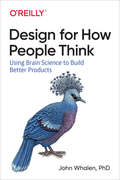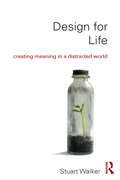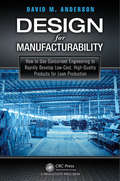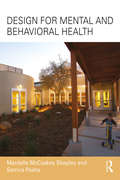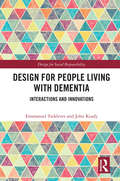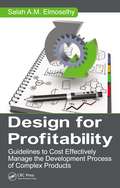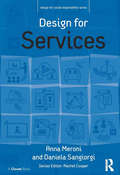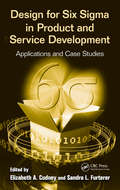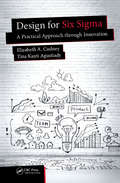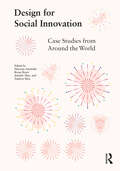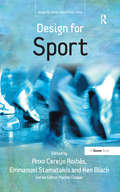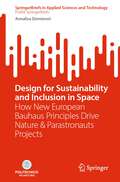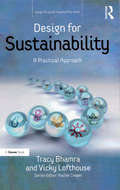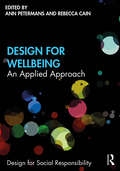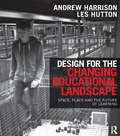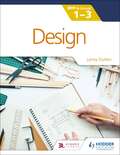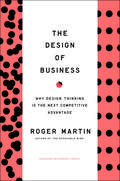- Table View
- List View
Design for How People Think: Using Brain Science to Build Better Products
by John WhalenUser experience doesn’t happen on a screen; it happens in the mind, and the experience is multidimensional and multisensory. This practical book will help you uncover critical insights about how your customers think so you can create products or services with an exceptional experience.Corporate leaders, marketers, product owners, and designers will learn how cognitive processes from different brain regions form what we perceive as a singular experience. Author John Whalen shows you how anyone on your team can conduct "contextual interviews" to unlock insights. You’ll then learn how to apply that knowledge to design brilliant experiences for your customers.Learn about the "six minds" of user experience and how each contributes to the perception of a singular experienceFind out how your team—without any specialized training in psychology—can uncover critical insights about your customers’ conscious and unconscious processesLearn how to immediately apply what you’ve learned to improve your products and servicesExplore practical examples of how the Fortune 100 used this system to build highly successful experiences
Design for Life: Creating Meaning in a Distracted World
by Stuart WalkerStuart Walker’s design work has been described as life-changing, inspiring, disturbing and ferocious. Drawing on an extraordinarily diverse range of sources and informed by creative practice, Design for Life penetrates to the heart of modern culture and the malaise that underlies today’s moral and environmental crises. The author argues that this malaise is deep-seated and fundamental to the modern outlook. He shows how our preoccupation with technological progress, growth and the future has produced a constricted view of life – one that is both destructive and self-reinforcing. Based on over twenty-five years of scholarship and creative practice, he demonstrates the vital importance of solitude, contemplation, inner growth and the present moment in developing a different course – one that looks squarely at our current, precarious situation while offering a positive, hopeful way forward – a way that is compassionate, context-based, human scale, ethically motivated and critically creative. Design for Life is an intensely original contribution that will be essential reading for design practitioners and students. Written in a clear, accessible style, it will also appeal to a broader readership, especially anyone who is concerned with contemporary society’s rising inequalities and environmental failings and is looking for a more constructive, balanced and thoughtful direction.
Design for Manufacturability: How to Use Concurrent Engineering to Rapidly Develop Low-Cost, High-Quality Products for Lean Production
by David M. AndersonDesign for Manufacturability: How to Use Concurrent Engineering to Rapidly Develop Low-Cost, High-Quality Products for Lean Production shows how to use concurrent engineering teams to design products for all aspects of manufacturing with the lowest cost, the highest quality, and the quickest time to stable production. Extending the concepts of desi
Design for Manufacturability: How to Use Concurrent Engineering to Rapidly Develop Low-Cost, High-Quality Products for Lean Production, Second Edition
by David M. AndersonAchieve any cost goals in half the time and achieve stable production with quality designed in right-the-first-time. Design for Manufacturability: How to Use Concurrent Engineering to Rapidly Develop Low-Cost, High-Quality Products for Lean Production is still the definitive work on DFM. This second edition extends the proven methodology to the most advanced product development process with the addition of the following new, unique, and original topics, which have never been addressed previously. These topics show you how to: Cut cost from 1/2 to 1/10 in 9 categories—with ways to remove that much cost from product charges and pricing Commercialize innovation—starting with Manufacturable Research and learning from the new section on scalability, you will learn how to design products and processing equipment to scale quickly to any growth levels Design product families that can be built "on-demand" in platform cells that also "mass customize" products to-order Make Lean production easier to implement with much more effective results while making build-to-order practical with spontaneous supply chains and eliminating forecasted inventory by including an updated chapter on "Designing Products for Lean Production" The author’s 30 years of experience teaching companies DFM based on pre-class surveys and plant tours is the foundation of this most advanced design process. It includes incorporating dozens of proven DFM guidelines through up-front concurrent-engineering teamwork that cuts the time to stable production in half and curtails change orders for ramps, rework, redesign, substituting cheaper parts, change orders to fix the changes, unstable design specs, part obsolescence, and late discovery of manufacturability issues at periodic design reviews. This second edition is for the whole product development community, including: Engineers who want to learn the most advanced DFM techniques Managers who want to lead the most advanced product development Project team leaders who want to immediately apply all the principles taught in this book in their own micro-climate Improvement leaders and champions who want to implement the above and ensure that the company can design products and versatile processing equipment for low-volume/high-mix product varieties Designing half to a tenth of cost categories can avoid substituting cheap parts, which degrades quality, and encourages standardization and spontaneous supply chains, which will encourage Lean initiatives. Using cellular manufacturing to shift production between lines for mixed production of platforms and build-to-order to offer the fastest order fulfillment can beat any competitors’ delivery time.
Design for Mental and Behavioral Health
by Mardelle McCuskey Shepley Samira PashaStudies confirm that the physical environment influences health outcomes, emotional state, preference, satisfaction and orientation, but very little research has focused on mental and behavioural health settings. This book summarizes design principles and design research for individuals who are intending to design new mental and behavioural health facilities and those wishing to evaluate the quality of their existing facilities. The authors discuss mental and behavioural health systems, design guidelines, design research and existing standards, and provide examples of best practice. As behavioural and mental health populations vary in their needs, the primary focus is limited to environments that support acute care, outpatient and emergency care, residential care, veterans, pediatric patients, and the treatment of chemical dependency.
Design for People Living with Dementia: Interactions and Innovations (Design for Social Responsibility)
by John Keady Emmanuel TseklevesThere were an estimated 50 million people worldwide living with dementia in 2017 and this number will almost double every 20 years, reaching 75 million in 2030. Design has significant potential to contribute to managing this global concern. This book is the first to synthesise the considerable research and projects in dementia and design. Design interactions is a new way of considering how we can improve the relationship between people, products, places and services and of course technology trends, such as the ‘internet of things’, offer great opportunities in providing new ways to connect people with services and products that can contribute to healthier lifestyles and mechanisms to support people with acute and chronic conditions. In light of this, the book explores the contribution and future potential of design for dementia through the lens of design interactions, such as people, contexts, material and things. Design for People Living with Dementia is a guide to this innovative and cutting-edge field in healthcare. This book is essential reading for healthcare managers working to provide products, services and care to people with dementia, as well as design researchers and students. .
Design for Profitability: Guidelines to Cost Effectively Manage the Development Process of Complex Products (Systems Innovation Book Series)
by Salah Ahmed AlmoslehySince the success of products significantly depends on the quality of product performance, inadequate management of the product design process can lead to improper performance of products that can result in significant long-term business losses. Design for Profitability: Guidelines to Cost Effectively Manage the Development Process of Complex Products presents a design guideline for complex product design and development that enables you to cost-effectively improve the technical performance of your products and consequently improve your competitiveness in the marketplace as well as improve profitability.The book helps you improve the competitiveness of your organization in the market and eventually improve profitability. It presents a mobile robots design guideline based on an empirical study of the mobile robots design process. This is an unprecedented guideline based on the empirical investigation of the internal aspects of the design process of complex products for cost-effectively enhancing the competitiveness in the market. The book also presents a hybrid lean-agile design paradigm for mobile robots. In addition, it points out key approaches and risks to manage the product development process efficiently. In designing complex products and integrated systems, industrial designers face a dilemma of cost-effectively striking a balance between product development time and product performance attributes. This book shows how and when value is added in product design and development through identifying statistically the most and least correlated design activities and strategies to product performance attributes. Introducing a new paradigm in the field of engineering design, the book gives you key approaches to efficiently manage the product development process.
Design for Secure Residential Environments (Chartered Institute of Building)
by Steve Crouch Henry Shaftoe Roy FlemingThere is currently a great deal of interest in crime prevention and how it can be reduced through better design. Design for a Secure Residential Environment provides the framework on which the risk of crime can be reduced through sensible design of the vulnerable parts of houses, community buildings and small commercial premises and the environment immediately surrounding the buildings.This book looks at how buildings should be assessed for security measures. It then looks at the design of external and communal areas, how lighting can improve security and then covers methods of making doors and windows secure. It describes various methods of electronic security and concludes with a chapter on how to plan and implement suitable security measures.
Design for Services: Key Issues And New Directions (Design for Social Responsibility)
by Daniela Sangiorgi Anna MeroniIn Design for Services, Anna Meroni and Daniela Sangiorgi articulate what Design is doing and can do for services, and how this connects to existing fields of knowledge and practice. Designers previously saw their task as the conceptualisation, development and production of tangible objects. In the twenty-first century, a designer rarely 'designs something' but rather 'designs for something': in the case of this publication, for change, better experiences and better services. The authors reflect on this recent transformation in the practice, role and skills of designers, by organising their book into three main sections. The first section links Design for Services to existing models and studies on services and service innovation. Section two presents multiple service design projects to illustrate and clarify the issues, practices and theories that characterise the discipline today; using these case studies the authors propose a conceptual framework that maps and describes the role of designers in the service economy. The final section projects the discipline into the emerging paradigms of a new economy to initiate a reflection on its future development.
Design for Six Sigma in Product and Service Development: Applications and Case Studies
by Sandra L. Furterer Elizabeth A. CudneyReal-world examples and hands-on experience are invaluable resources when learning how to use new methods and tools, whether in training or in a classroom. Yet there are very few books on Design for Six Sigma (DFSS) that provide the practical knowledge required to be up and running quickly. Until now. Design for Six Sigma in Product and Service Dev
Design for Six Sigma: A Practical Approach through Innovation (Continuous Improvement Series)
by Elizabeth A. Cudney Tina Kanti AgustiadyDesign for Six Sigma (DFSS) is an innovative continuous improvement methodology for designing new products, processes, and services by integrating Lean and Six Sigma principles. This book will explain how the DFSS methodology is used to design robust products, processes, or services right the first time by using the voice of the customer to meet Six Sigma performance. Robust designs are insensitive to variation and provide consistent performance in the hands of the customer. DFSS is used to meet customer needs by understanding their requirements, considering current process capability, identifying and reducing gaps, and verifying predictions to develop a robust design. This book offers: Methodology on how to implement DFSS in various industries Practical examples of the use of DFSS Sustainability utilizing Lean Six Sigma techniques and Lean product development Innovative designs using DFSS with concept generation Case studies for implementing the DFSS methodology Design for Six Sigma (DFSS) enables organizations to develop innovative designs. In order to redesign an existing process or design a new process, the success is dependent on a rigorous process and methodology. DFSS ensures that there are minimal defects in the introduction of new products, processes, or services. The authors have compiled all of the tools necessary for implementation of a practical approach though innovation.
Design for Social Innovation: Case Studies from Around the World
by Jennifer May Mariana Amatullo Bryan Boyer Andrew SheaThe United Nations, Australia Post, and governments in the UK, Finland, Taiwan, France, Brazil, and Israel are just a few of the organizations and groups utilizing design to drive social change. Grounded by a global survey in sectors as diverse as public health, urban planning, economic development, education, humanitarian response, cultural heritage, and civil rights, Design for Social Innovation captures these stories and more through 45 richly illustrated case studies from six continents. From advocating to understanding and everything in between, these cases demonstrate how designers shape new products, services, and systems while transforming organizations and supporting individual growth. How is this work similar or different around the world? How are designers building sustainable business practices with this work? Why are organizations investing in design capabilities? What evidence do we have of impact by design? Leading practitioners and educators, brought together in seven dynamic roundtable discussions, provide context to the case studies. Design for Social Innovation is a must-have for professionals, organizations, and educators in design, philanthropy, social innovation, and entrepreneurship. This book marks the first attempt to define the contours of a global overview that showcases the cultural, economic, and organizational levers propelling design for social innovation forward today.
Design for Sport (Design for Social Responsibility)
by Anxo Cereijo Roibás Emmanuel StamatakisDesign for Sport shows how socially responsible design can contribute to make sport practice widespread in the general population including disadvantaged and hard-to-reach groups, and those that have been traditionally excluded such as the elderly, disabled people, those living in deprived areas and from lower socioeconomic strata plus certain minority ethnic and religious groups. Contributions from around the world provide compelling case studies and an international perspective. While the main benefit from expanding sports practice in developed societies would be reduction of chronic disease rates and social inclusion, in the developing world where political instability and conflict are more common, the authors look at how sport can have other functions, such as a means of post-disaster relief. They discuss how Participatory Design (PD) techniques and appropriate ethnographies can be implemented in order to better understand users' needs and requirements as in the case of Paralympic sport where the increased sophistication of equipment used has evolved to meet the demands of the athletes. Reflecting the multi-disciplinary and cross-disciplinary nature of design for sport, the book also features case studies that look at environmental design to improve sport accessibility, social wellbeing, economic development and environmental sustainability.
Design for Sustainability and Inclusion in Space: How New European Bauhaus Principles Drive Nature & Parastronauts Projects (SpringerBriefs in Applied Sciences and Technology)
by Annalisa DominoniThis book offers a cutting-edge perspective of design for space to increase astronauts’ wellbeing and performance creating a more sustainable and inclusive environment, but without to forget beauty. The relevant aspect is that these design principles are now also supported and promoted by the European Community with the New European Bauhaus project. It is legitimate to affirm that Space Design is a precursor and inspiring these principles. Space exploration has shown us how results of space research inspire management policies addressing important earth issues such as the responsible use of resources as well as ethical behavior leading to sustainable and inclusive choices. The International Space Station (ISS) is the most successful virtuous example of circular economy and sustainability by almost totally recycling the waste produced. Recently the European Space Agency (ESA) launched the first call for “parastronauts” opening the fly possibilities to people with physical disabilities and thus affirming the principle of inclusion in space. Thanks to design—a bridge between science, technology, and beauty—space opens up to new creative experiments, placing the human being at the center of the interplanetary exploration programs to ensure extra-terrestrial habitats safer, more comfortable, and efficient, where crew will feel “like at home”.
Design for Sustainability: A Practical Approach (Design for Social Responsibility)
by Tracy Bhamra Vicky LofthouseDesign for Sustainability is a practical approach to design which focuses on the challenges and issues faced by those designing consumer products in the 21st Century. It is written from a design perspective and aimed at both professional and student industrial and product designers, and those involved in managing design. The book begins by summarising the historical and current issues of the environmental debate in the context of sustainable product development, highlighting the benefits gained from considering the impact on the environment and issues of sustainability when designing. The authors answer the questions: What is sustainable product development and why is it important? What are the main drivers of sustainable product development? They explain how design can help to control human impact on the environment by not only minimising pollution, waste, energy use and use of scarce resources, but also by thinking outside the box to create systems and services that can reduce the number of products manufactured. The aim is to put sustainable development within a commercial context and introduce a new focus for design. Design for Sustainability outlines and assesses the methods, tools and techniques available to designers, both for design innovation and design improvement. A wide range of case studies are presented across a number of product sectors including electrical goods, IT and furniture. Initially they demonstrate product improvement and redesign, examples include those that reduce waste, pollution and energy consumption, designing for recycling and reuse of parts. Further examples are then provided exemplifying the more radical approach of system and service design. The final section takes the reader through a whole sustainable design project from start to finish, from brief to manufacture. References and sources of information are also included.
Design for Tall Buildings in China: Past, Present, and Future Fire and Life Safety (The Society of Fire Protection Engineers Series)
by Fang LIThis book provides readers an approach to overall fire and life-life design of high-rise buildings in a way that meets all stakeholders’ objectives. It describes how China began constructing tall and super tall buildings decades ago and imparts many lessons learned through those experiences along with similar projects from all over the world. The author explains the technology and culture for tall building design in China as a context for how the world seeks to ensure fire and life safety in these remarkable structures.
Design for Wellbeing: An Applied Approach (Design for Social Responsibility)
by Ann Petermans Rebecca CainDesign for Wellbeing charts the development and application of design research to improve the personal and societal wellbeing and happiness of people. It draws together contributions from internationally leading academics and designers to demonstrate the latest thinking and research on the design of products, technologies, environments, services and experiences for wellbeing. Part I starts by conceptualising wellbeing and takes an in-depth look at the rise of the design for wellbeing movement. Part II then goes on to demonstrate design for wellbeing in practice through a broad range of domains from products and environments to services. Among others, we see emerging trends in the design of interiors and urban spaces to support wellbeing, designing to enable and support connectedness and social interaction, and designing for behaviour change to tackle unhealthy eating behaviour in children. Significantly, the body of work on subjective wellbeing, design for happiness, is increasing, and several case studies are provided on this, demonstrating how design can contribute to support the wellbeing of people. Part III provides practical guidance for designing for wellbeing through a range of examples of tools, methods and approaches, which are highly user-centric, participatory, critical and speculative. Finally, the book concludes in Part IV with a look at future challenges for design for wellbeing. This book provides students, researchers and practitioners with a detailed assessment of design for wellbeing, taking a distinctive global approach to design practice and theory in context. Design for Wellbeing concerns designers and organisations but also defines its broader contribution to society, culture and economy.
Design for a Better Future: A guide to designing in complex systems
by John Body Nina TerreyThe world we live in is increasingly complex. It throws up complex problems. This book is about tackling them. <P><P> At ThinkPlace, we’ve pioneered the application of design thinking to complex challenges like climate change, family violence and global malnutrition. We work globally with governments, organisations and communities using a methodology – the Design System™ outlined in this book – that has been developed over more than a decade. <P><P> We bring together different voices and help them to create better futures. If you’re one of those voices, or would like to be, this book is for you. It’s part roadmap, part instruction manual, but mostly it’s a clarion call for a new way of doing things: tackling the world’s biggest problems in a way that brings people together and produces positive, lasting change.
Design for a Sustainable Culture: Perspectives, Practices and Education (Routledge Studies in Culture and Sustainable Development)
by Astrid Skjerven Janne ReitanAs culture is becoming increasingly recognised as a crucial element of sustainable development, design competence has emerged as a useful tool in creating a meaningful life within a sustainable mental, cultural and physical environment. Design for a Sustainable Culture explores the relationship between sustainability, culture and the shaping of human surroundings by examining the significance and potential of design as a tool for the creation of sustainable development. Drawing on interdisciplinary case studies and investigations from Europe, North America and India, this book discusses theoretical, methodological and educational aspects of the role of design in relation to human well-being and provides a unique perspective on the interface between design, culture and sustainability. This book will appeal to researchers as well as postgraduate and undergraduate students in design and design literacy, crafts, architecture and environmental planning, but also scholars of sustainability from other disciplines who wish to understand the role and impact of design and culture in sustainable development.
Design for the Changing Educational Landscape: Space, Place and the Future of Learning
by Andrew Harrison Les HuttonThe whole landscape of space use is undergoing a radical transformation. In the workplace a period of unprecedented change has created a mix of responses with one overriding outcome observable worldwide: the rise of distributed space. In the learning environment the social, political, economic and technological changes responsible for this shift have been further compounded by constantly developing theories of learning and teaching, and a wide acceptance of the importance of learning as the core of the community, resulting in the blending of all aspects of learning into one seamless experience. This book attempts to look at all the forces driving the provision and pedagogic performance of the many spaces, real and virtual, that now accommodate the experience of learning and provide pointers towards the creation and design of learning-centred communities. Part 1 looks at the entire learning universe as it now stands, tracks the way in which its constituent parts came to occupy their role, assesses how they have responded to a complex of drivers and gauges their success in dealing with renewed pressures to perform. It shows that what is required is innovation within the spaces and integration between them. Part 2 finds many examples of innovation in evidence across the world – in schools, the higher and further education campus and in business and cultural spaces – but an almost total absence of integration. Part 3 offers a model that redefines the learning landscape in terms of learning outcomes, mapping spatial requirements and activities into a detailed mechanism that will achieve the best outcome at the most appropriate scale. By encouraging stakeholders to creating an events-based rather than space-based identity, the book hopes to point the way to a fully-integrated learning landscape: a learning community.
Design for the IB MYP 1-3: By Concept
by Lenny DuttonEnsure your students navigate the MYP framework with confidence using a concept-driven and assessment-focused approach to Design, presented in global contexts. - Develop conceptual understanding with key concepts and related concepts, set in global contexts, at the heart of each chapter. -Prepare for every aspect of assessment using support and tasks designed by an experienced educator. - Extend learning through research projects and interdisciplinary opportunities. - Apply global contexts in meaningful ways with an internationally-minded perspective. - Develop practical and creative-thinking skills to solve design problems with a statement of inquiry in each chapter. - Confidently cover the framework with chapters covering digital, product and combined design.
Design for the IB MYP 1-3: By Concept
by Lenny DuttonEnsure your students navigate the MYP framework with confidence using a concept-driven and assessment-focused approach to Design, presented in global contexts. - Develop conceptual understanding with key concepts and related concepts, set in global contexts, at the heart of each chapter. -Prepare for every aspect of assessment using support and tasks designed by an experienced educator. - Extend learning through research projects and interdisciplinary opportunities. - Apply global contexts in meaningful ways with an internationally-minded perspective. - Develop practical and creative-thinking skills to solve design problems with a statement of inquiry in each chapter. - Confidently cover the framework with chapters covering digital, product and combined design.
Design for the IB MYP 4&5: By Concept
by Lenny DuttonEnsure your students navigate the MYP framework with confidence using a concept-driven and assessment-focused approach to Design, presented in global contexts. - Develop conceptual understanding with key concepts and related concepts, set in global contexts, at the heart of each chapter. -Prepare for every aspect of assessment using support and tasks designed by an experienced educator. - Extend learning through research projects and interdisciplinary opportunities. - Apply global contexts in meaningful ways with an internationally-minded perspective. - Develop practical and creative-thinking skills to solve design problems with a statement of inquiry in each chapter. - Confidently cover the framework with chapters covering digital, product and combined design.Table Content: Unit 1 Global Goals Design Challenge Unit 2 Design to help people express their emotions Unit 3 Playground design Unit 4 Lights change lives Unit 5 Service promotion Unit 6 Gamified exercise Unit 7 Pedestrian safety Unit 8 The importance of toilets Unit 9 Human impact animation Unit 10 Play with the past Unit 11 Dealing with change Unit 12 Turning drawings into products
Design for the IB MYP 4&5: By Concept (MYP By Concept)
by Lenny DuttonEnsure your students navigate the MYP framework with confidence using a concept-driven and assessment-focused approach to Design, presented in global contexts. - Develop conceptual understanding with key concepts and related concepts, set in global contexts, at the heart of each chapter. -Prepare for every aspect of assessment using support and tasks designed by an experienced educator. - Extend learning through research projects and interdisciplinary opportunities. - Apply global contexts in meaningful ways with an internationally-minded perspective. - Develop practical and creative-thinking skills to solve design problems with a statement of inquiry in each chapter. - Confidently cover the framework with chapters covering digital, product and combined design.Table Content: Unit 1 Global Goals Design Challenge Unit 2 Design to help people express their emotions Unit 3 Playground design Unit 4 Lights change lives Unit 5 Service promotion Unit 6 Gamified exercise Unit 7 Pedestrian safety Unit 8 The importance of toilets Unit 9 Human impact animation Unit 10 Play with the past Unit 11 Dealing with change Unit 12 Turning drawings into products
Design of Business
by Roger L. MartinMost companies today have innovation envy. They yearn to come up with a game-changing innovation like Apple's iPod, or create an entirely new category like Facebook. Many make genuine efforts to be innovative-they spend on R&D, bring in creative designers, hire innovation consultants. But they get disappointing results.Why? In The Design of Business, Roger Martin offers a compelling and provocative answer: we rely far too exclusively on analytical thinking, which merely refines current knowledge, producing small improvements to the status quo.To innovate and win, companies need design thinking. This form of thinking is rooted in how knowledge advances from one stage to another-from mystery (something we can't explain) to heuristic (a rule of thumb that guides us toward solution) to algorithm (a predictable formula for producing an answer) to code (when the formula becomes so predictable it can be fully automated). As knowledge advances across the stages, productivity grows and costs drop-creating massive value for companies.Martin shows how leading companies such as Procter & Gamble, Cirque du Soleil, RIM, and others use design thinking to push knowledge through the stages in ways that produce breakthrough innovations and competitive advantage.Filled with deep insights and fresh perspectives, The Design of Business reveals the true foundation of successful, profitable innovation.
